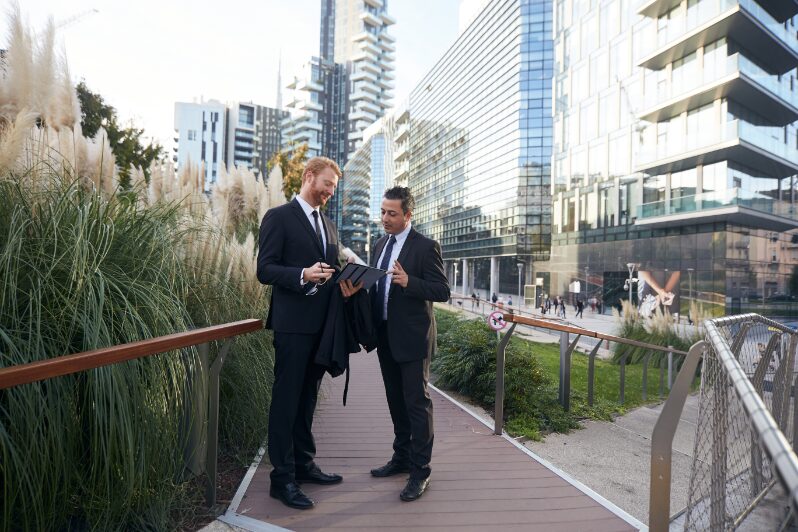This article will expound on Dubai audit services' understanding of preexisting relationships and reacquired rights under IFRS 3.
Let us get started, shall we?
The acquirer and acquirer may have a preexisting relationship before they begin the negotiations for business combinations. Or, they might enter into a separate arrangement during the business combination negotiations.
The acquirer will determine any amount not part of the transaction between the acquirer and acquire in any situation mentioned above. As part of the acquisition process, the acquirer will only consider transfer made to the acquiree and the assets accrued and liabilities recognized during the exchange process. Financial audit teams will treat all separate transactions based on the applicable IFRSs.
An acquisition transaction was made for the acquirer or primarily for the benefit of the combined acquirer or entity. But not primarily for the use of acquiree, or former owners, before the combination is considered a separate transaction.
Here are some examples of separate transactions that should not include when audit firms in Dubai and inhouse internal auditors apply the acquisition method:
- A transaction that establishes existing relationships between the acquirer
- A transaction in which the acquiree remunerates its employees or former owners for future service.
- A transaction where the acquiree or original owners is repaid for the expenses of the acquisition.
To determine if a transaction is part of an exchange or separate from any business combination, the company audit specialists should examine if the following factors are mutually exclusive or individually conclusive:
The Reasons For The Transaction:
Understanding the reasons the acquirer and acquiree – in this case, owners, directors, managers, and brokers – carried out a transaction or arrangement can help determine if they were part of the consideration and what assets or liabilities were assumed.
Suppose a transaction is done primarily for the benefit of the acquirer or any combined Dubai entity and not principally for the benefit of the acquire/its former owners before the combination. In that case, the acquiree will receive a smaller share of the transaction price as part of the deal. The acquirer in Dubai UAE would then account for this part separately from the business combinations.
Initiator of Transaction:
Knowing who initiated the transaction can help determine if it should be included in the acquisition. Trade is made in Dubai, UAE, or any other event could be an example. The initiated acquirer can subscribe to determine economic benefits in the future for the acquirer or other integrated entities that have received very little or almost no benefit from the acquirer and its former owners before the combination.
A transaction or agreement initiated by an acquired Dubai entity or its former owners has a lower benefit to the acquirer. It is more likely to be included in the business combination.
The Transaction Time:
This information might determine if the transaction should be included in exchange for the acquired entity. Any transaction between acquirer and acquiree during negotiations on the terms of a company combination may have been done in observation of the business mixture to make possible economic benefits in the future for either the acquirer or the combined Dubai entity.
Before the business merger, the acquiree and its ex-owners are not expected to get any benefit, if any, from the transaction. They will only be able to enjoy the benefits of the combined entity. Settlement of preexisting relationships between acquirer and acquiree through a business combination
An acquirer and acquiree may have had a relationship before the contemplated business combination. This is known as a "preexisting relation". The acquirer and acquiree might have a preexisting contractual relationship such as the seller and customer, licensor, licensee, or non-contractual—for instance, plaintiff and defendant. If the business combination creates a preexisting relationship, the acquirer will recognize a gain or loss.
Fair value for a preexisting, non-contractual relationship:
For a pre-existing contract relationship, the lower of (i) / (ii).
(i) The contract's amount is favorable from the acquirer's standpoint compared to current market terms for similar or identical items. An unfavorable agreement is not favorable in current market terms. It does not have to be a burdensome contract. The unavoidable cost of fulfilling the contract obligations exceeds the expected economic benefits.
(iii) The amount of any settlement provisions in the contract available to the counterparty if the agreement is not favorable.
If (iii) is lower than (i), the difference is added to the business combination accounting.
The amount of the gain or loss Dubai company financial audit teams recognize may affect whether an acquirer has previously identified a related asset, liability, or both. Therefore, the reported gain or loss may differ from the amount calculated using the above requirements.
An acquirer can recognize a preexisting relationship as a reacquired right. The contract may contain unfavorable or favorable terms in comparison to the current market price for similar or identical items. The acquirer will recognize any gain or loss for adequate settlement separate from the business combination.
Audit Firm in Dubai – Complete Audit Services in UAE
Our audit services in UAE are affordable and efficient. Contact an expert today for your accounting and auditing issues.
Read also: How Audit Firms Dubai Identify Combination Based On IFRS 3
Theshani is a Senior auditor and has experience of 4+ years in providing audit assurance and advisory services to a wide range of industry clients. She continues to stay on top of ever-changing industry dynamics by continuously learning and developing expertise.
